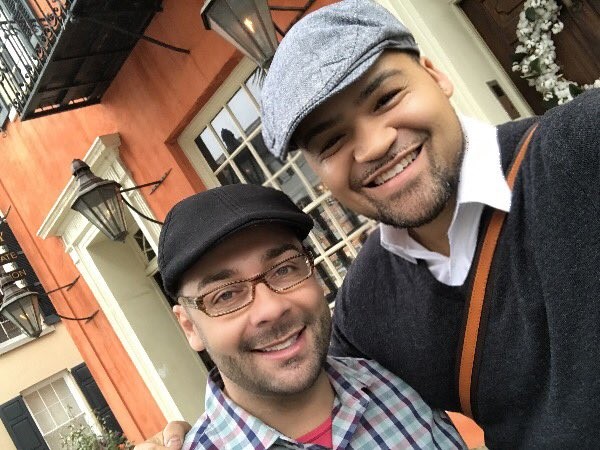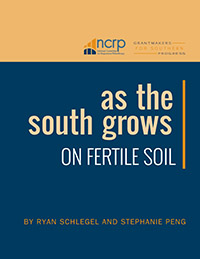Blog
Through Hell or High Water: The #FundSouth Movement is Strong
Foundations have had an “on again, off again” love affair with the South. Funding there tends to be short-term and typically in response to a natural disaster, a national crisis or an election, but some significant infrastructure has been laid to coordinate and expand opportunities for sustained foundation giving.

Edgar Villanueva, Vice President of Programs, Schott Foundation for Public and William Cordery, Co-Chair, Funders for a Just Economy, in Charleston, SC, April 5, 2017.
That’s why last week, I and approximately 200 grantmakers and advocates from across the nation traversed horrific storms and endured prolonged travel delays to get to Charleston, South Carolina, for the Grantmakers for Southern Progress (GSP) 2017 Regional Convening. GSP is a philanthropic solutions hub that builds, aligns, and leverages resources and learning for strategic structural change efforts in the South. The three-day convening provided space to have discussions about capacity-building, building power for progressive change, racial justice, economic opportunity, and advancing equity in public education. It was also an opportunity to tour South Carolina’s Low Country and explore the history, culture and the sustainable future of the region and examine community development in North Charleston.
My flight from New York was diverted to Charlotte, where I luckily rented a car to drive the rest of the way. Even as dozens of other conference-goers were impacted by storms—one individual had to hire a rideshare to drive her all the way from Atlanta—nothing could deter us from getting there. Why the determination?
For me, it was personal.
I grew up in the South. I started my grantmaking career in North Carolina. For more than a decade, I’ve been advocating for increased philanthropic investment in the South. In 2013, I took my advocacy to social media, starting the hashtag #FundSouth as a direct response to conversations about the underinvestment of philanthropic dollars in Southern social change work. I was making my way to Charleston, along with many others who felt the same, to discuss the opportunities, challenges and best strategies for supporting structural change and advancing progress in the South.
 To kick off the convening, GSP and the National Committee for Responsive Philanthropy (NCRP) released, “As the South Grows: On Fertile Soil.” The report notes, “Despite growing challenges to civil rights, inclusion and economic justice across the country, and especially in the South, the philanthropic sector has not recognized the potential in local organizations and the legacy civil rights infrastructure of the Alabama Black Belt, the Mississippi Delta and places like them across the South.” It highlights that the South is “rich with natural leaders and existing organizations” but that funders often fail to recognize these local leaders. The report provided recommendations to philanthropies:
To kick off the convening, GSP and the National Committee for Responsive Philanthropy (NCRP) released, “As the South Grows: On Fertile Soil.” The report notes, “Despite growing challenges to civil rights, inclusion and economic justice across the country, and especially in the South, the philanthropic sector has not recognized the potential in local organizations and the legacy civil rights infrastructure of the Alabama Black Belt, the Mississippi Delta and places like them across the South.” It highlights that the South is “rich with natural leaders and existing organizations” but that funders often fail to recognize these local leaders. The report provided recommendations to philanthropies:
-
- Understand context. Build authentic, transformational relationships.
- Appreciate collective power. Explore advocacy funding as a complementary strategy to funding direct service.
- Focus on shared goals and value different approaches. Set a “big table” inclusive enough for diverse local and national partners.
- Make long-term, flexible commitments of capital, time, and capacity.
With that grounding, attendees of the convening discussed next steps for moving forward together, asking: What are ways that funders and practitioners can effectively work and learn together as partners to forge progress in the region? What are concrete steps to creating regional learning opportunities? Is there a desire to continue to move this conversation forward? If so, what should be our next steps?
I left Charleston on Friday, a sunny day, pondering these five key points made at the conference:
-
- To be a progressive grantmaker is to be an organizer inside an organization and the philanthropic sector.
- We cannot ignore race and gender, and we build solutions moving forward.
- Trust leaders in the South, especially women of color. It’s the birthplace of social justice work.
- Make a long-term commitment–Don’t pop in and out.
- It’s important to fund people who are in relationship with community–and listen to their stories.
A former GSP Steering Committee member, William Cordery, also a son of the South, wrote #FundSouth: It’s More Than a Hashtag, It’s a Movement and shared that “for decades the South has been a testing ground for regressive and harmful policies that eventually roll out on a national level.” Moreover, the South has also been “ground zero for social movements to be seeded and grown that have changed the course of this country’s history.” Now, he said, “is the time for philanthropy to increase and coordinate long-term investment to strengthen the social justice infrastructure in the region.”
Convening discussions were echoes of this call: We must fund the South; we must learn from its rich and complex history of oppression and liberation. And we must work together across institutions and pre-determined grantmaking strategies to do so. Our new national political reality demands it.
We in philanthropy have been presented with an enormous opportunity to fund movement-building in the South. At the Schott Foundation for Public Education, we’ve supported amazing partners in Mississippi, Louisiana, and Arkansas. From our work in the region, we know that movement-building and progress in the region is possible. It is well-resourced with people, smart organizing strategies and a commitment to long-term change. It’s time for philanthropy to match the commitment and passion of the local community. The rain has fallen, the storm is clearing, and the soil is fertile with progress. #FundSouth.
Edgar Villanueva is Vice-President of Programs and Advocacy at the Schott Foundation.


